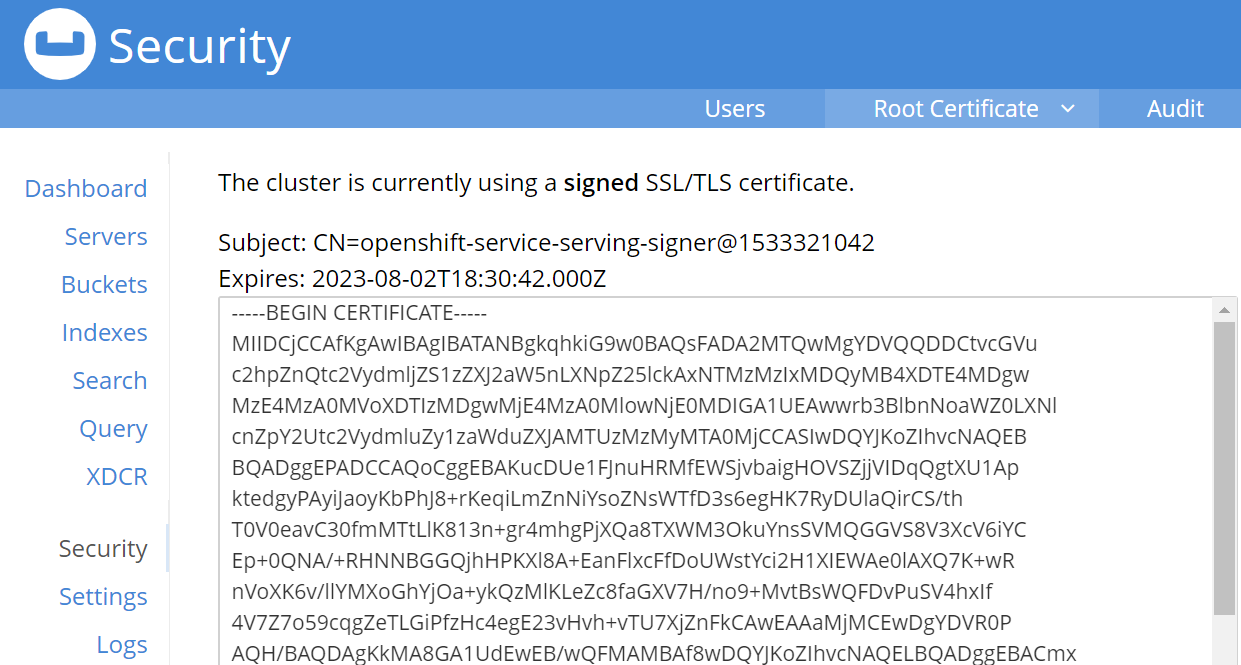Couchbase SSL
If you have followed dynamic creation of java keystores in OpenShift post and wondered how to use similar concepts for couchbase database and a java application. This post will help you.
Couchbase setup
This is the couchbase documentation for configuring server side certificates, we are interested in last few steps since OpenShift will generate key and cert by adding annotation to the couchbase service.
Note: By adding this annotation you can dynamically create certificates
service.alpha.OpenShift.io/serving-cert-secret-name: couchbase-db-certs
couchbase service looks like this:
apiVersion: v1
kind: Service
metadata:
annotations:
kubectl.kubernetes.io/last-applied-configuration: ""
service.alpha.OpenShift.io/serving-cert-secret-name: couchbase-db-certs
labels:
component: couchbase-db
name: couchbase-db
namespace: myproject
spec:
ports:
- name: consolerest
port: 8091
protocol: TCP
targetPort: 8091
To convert certificates as couchbase expects, we are going to use an init container.
We will use an emptyDir volume to store cert and key in /opt/couchbase/var/lib/couchbase/inbox/ location so that couchbase can access them.
Init container will run sequence of commands to split certificate, place them into /opt/couchbase/var/lib/couchbase/inbox/ location and name cert file as chain.pem, key as pkey.key.
init container will look as follows:
initContainers:
- args:
- "-c"
- >-
csplit -z -f crt- $crtfile '/-----BEGIN CERTIFICATE-----/' '{*}'
&& for file in crt-*; do cat $file >
/opt/couchbase/var/lib/couchbase/inbox/service-$file; done && cat
$crtfile > /opt/couchbase/var/lib/couchbase/inbox/chain.pem && cat
$keyfile > /opt/couchbase/var/lib/couchbase/inbox/pkey.key
command:
- /bin/bash
env:
- name: keyfile
value: /var/run/secrets/OpenShift.io/services_serving_certs/tls.key
- name: crtfile
value: /var/run/secrets/OpenShift.io/services_serving_certs/tls.crt
- name: password
value: changeit
image: registry.access.redhat.com/redhat-sso-7/sso72-OpenShift:latest
imagePullPolicy: Always
name: couchbase-ssl
volumeMounts:
- mountPath: /var/run/secrets/OpenShift.io/services_serving_certs
name: couchbase-db-certs
- mountPath: /opt/couchbase/var/lib/couchbase/inbox/
name: couchbase-ssl-volume
volumes:
- emptyDir: {}
name: couchbase-ssl-volume
- name: couchbase-db-certs
secret:
defaultMode: 420
secretName: couchbase-db-certs
Next add couchbase-ssl-volume emptyDir volume mount to actual container so file can be access by couchbase.
spec:
containers:
- env:
...
volumeMounts:
- mountPath: /opt/couchbase/var/lib/couchbase/inbox/
name: couchbase-ssl-volume
I am using a rhel7-couchbase image, on startup it runs a initialization script to setup cluster; at that time we will upload the certificate, and activate it using these commands.
couchbase-cli ssl-manage -c http://localhost:8091 -u Administrator \
-p password --upload-cluster-ca=${SERVICE_CERT}
couchbase-cli ssl-manage -c http://localhost:8091 -u Administrator \
-p password --set-node-certificate
Pass the cert location as environment variable SERVICE_CERT in deployment config.
- env:
- name: SERVICE_CERT
value: /opt/couchbase/var/lib/couchbase/inbox/service-crt-01
Verify logs on container
SUCCESS: Uploaded cluster certificate to http://localhost:8091
SUCCESS: Node certificate set
We can also verify in couchbase UI
At this point couchbase setup is done.
Application setup
We will be using same steps as SSL client from dynamically-creating-java-keystores-OpenShift post
To make a secure connection to the couchbase, it will need the trust store generated by the pem-to-truststore initContainer. Here is the client’s app deployment config:
- apiVersion: v1
kind: DeploymentConfig
metadata:
labels:
app: ssl-client
name: ssl-client
spec:
replicas: 1
selector:
deploymentconfig: ssl-client
template:
metadata:
labels:
app: ssl-client
deploymentconfig: ssl-client
spec:
containers:
- name: ssl-client
image: ssl-client
imagePullPolicy: Always
env:
- name: JAVA_OPTIONS
value: -Djavax.net.ssl.trustStore=/var/run/secrets/java.io/keystores/truststore.jks -Djavax.net.ssl.trustStorePassword=changeit
- name: POD_NAMESPACE
valueFrom:
fieldRef:
apiVersion: v1
fieldPath: metadata.namespace
volumeMounts:
- mountPath: /var/run/secrets/java.io/keystores
name: keystore-volume
initContainers:
- name: pem-to-truststore
image: registry.access.redhat.com/redhat-sso-7/sso71-OpenShift:1.1-16
env:
- name: ca_bundle
value: /var/run/secrets/kubernetes.io/serviceaccount/service-ca.crt
- name: truststore_jks
value: /var/run/secrets/java.io/keystores/truststore.jks
- name: password
value: changeit
command: ["/bin/bash"]
args:
[
"-c",
"csplit -z -f crt- $ca_bundle '/-----BEGIN CERTIFICATE-----/' '{*}' && for file in crt-*; do keytool -import -noprompt -keystore $truststore_jks -file $file -storepass changeit -alias service-$file; done",
]
volumeMounts:
- mountPath: /var/run/secrets/java.io/keystores
name: keystore-volume
volumes:
- emtpyDir: {}
name: keystore-volume
The next step is to enable encryption and pass the path and password of the truststore generated by the initContainer
CouchbaseEnvironment env = DefaultCouchbaseEnvironment.builder().sslEnabled(true)
.sslTruststoreFile("/var/run/secrets/java.io/keystores/truststore.jks")
.sslTruststorePassword("changeit").build();
cachedCluster = CouchbaseCluster.create(env, "couchbase-db")
.authenticate("Administrator", "password");
Deploy your application, if successful you should see similar output in container logs
2019-08-28 15:33:27.952 INFO 1 --- [cTaskExecutor-1]
com.couchbase.client.core.CouchbaseCore : CouchbaseEnvironment:
{sslEnabled=true, sslKeystoreFile='null', sslTruststoreFile='/var/run/secrets/java.io/keystores/truststore.jks',
sslKeystorePassword=false, sslTruststorePassword=true,
sslKeystore=null, sslTruststore=null, bootstrapHttpEnabled=true,
bootstrapCarrierEnabled=true, bootstrapHttpDirectPort=8091,
...
